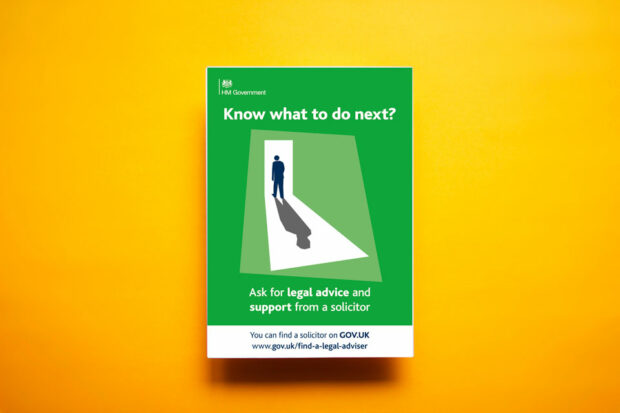In 2020, we commissioned a report to help us better understand and improve defendant engagement across the criminal court process.
The research found that providing information and guidance to defendants early – while in police custody – was a critical point of intervention to support defendants to better navigate and engage with the court process.
Research was conducted by Revolving Doors, an agency that champions long-term solutions for justice reform. They aim to tackle the root causes of reoffending and support people’s journeys towards better lives.
Based on the recommendations from their research, we decided to pilot a behavioural trial. We used messaging at different points during police custody to help reinforce the message that legal representation is available and can be helpful.
Read the Revolving Doors report.
Our approach
Using behavioural insight techniques such as salience of consequences and timely prompts to encourage action, we’ve designed a series of:
- posters
- leaflets
- in-cell messaging
The interventions help to reinforce the message that legal representation is available and can be helpful. They also give defendants information about the next steps in their journey. We’re currently trialling the interventions in Norfolk and Suffolk custody suites.
Posters are in prominent places, including booking-in areas and interview rooms.
There are 2 leaflets given to the defendant in custody - one at pre-charge and another at the point of charge. The leaflets contain messaging to encourage defendants to seek legal representation, where appropriate. They also signpost to further information about going to court.
We’ve also added stencilling to the cells to remind defendants that they can ask for legal advice and support when in the cell.

Measuring the pilot’s impact
To measure the effectiveness of the pilot, we’re gathering data and will compare the test sites in Norfolk and Suffolk to a non-intervention site. We expect to have the findings from this pilot early next year.
The Behavioural Insights team
Our team generates and applies behavioural insights to discover new, better and more cost-effective ways of delivering our services. We work with our service teams to:
- help define a problem in behavioural terms, including what behaviours need to change
- learn about the characteristics of target audiences to identify why they behave the way they do, by reviewing existing research and undertaking new research to address knowledge gaps
- design and test behaviourally informed interventions to find out what works and translate these findings into evidence-based recommendations
Contact the behavioural insights team for more information about the pilot, and sign up to email updates from our blog to keep up to date with all our latest blog posts.

1 comment
Comment by Mark Jones posted on
How will this work with the reduction of Duty Solicitors nation wide, such as Barnstaple and Skegness were the duty schemes have collapse due to a lack of lawyers prepared to under take work which is poorly paid.
If you look at the statistics it is clear that there are fewer legal aid firms doing crime and what is more important the number of duty solicitors has gone down for at least the second year in a row.
You can ask to detained person to ask for a lawyer but if there is no one to seem them how will it work.
How will you stop the police telling the detained person that getting a lawyer will take longer than to just get on with the interview, which is for the detained person to give there side of the event. this is often used in order for the police to get information and ask question a lawyer would not let them get away with. This is from personal experience of asking duty clients at court why did they not have a lawyer in the police interview.